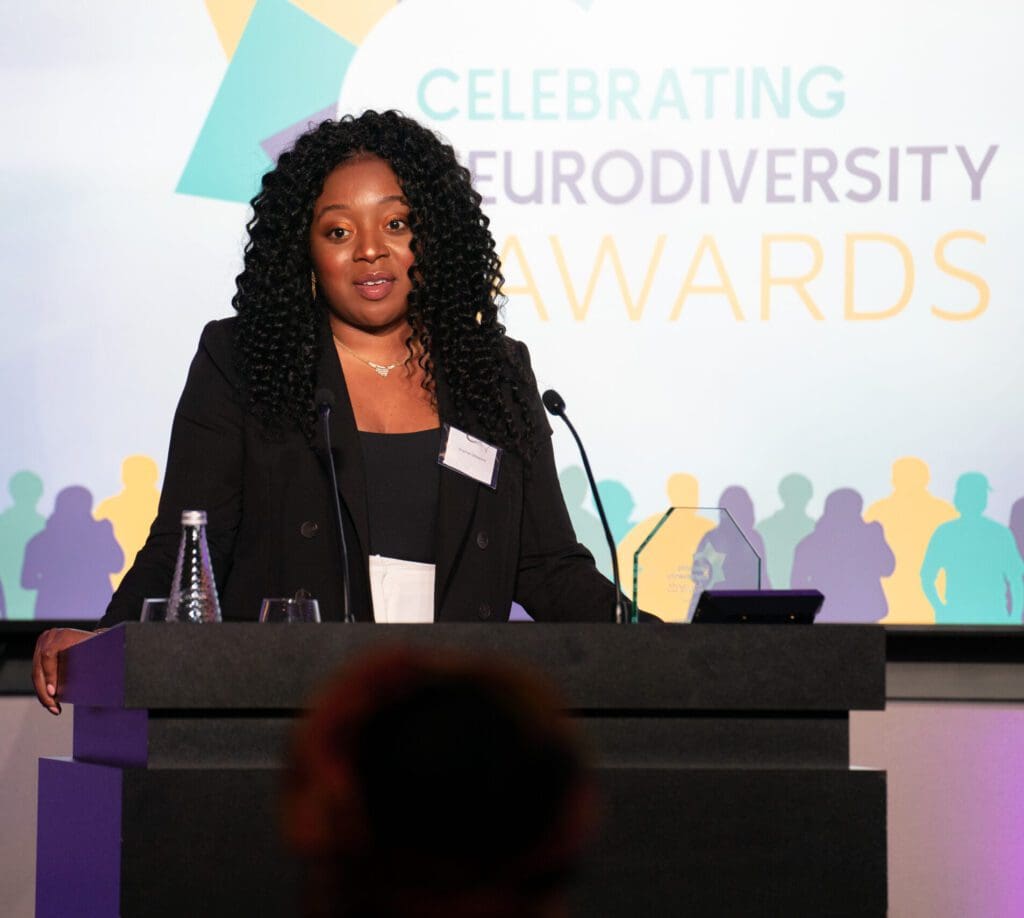Posted 10 Feb 2023
Onyinye Udokporo: Early Diagnosis Builds Exceptional Resilience For Dyslexics
Dyslexic strengths at work are increasingly discussed as hiring strategy and talent pipeline. Recently GCHQ and BAE Systems in the UK have targeted neurodivergent women, specifically, to add critical diversity of thought to their teams. Yet it is not a straight line from diagnosis to fulfilling potential, there are lots of pitfalls along the way. By focusing on those who have succeeded, we can sometime identify the critical junctures and scaffolds that make the difference.
Onyinye Udokporo is a successful Dyslexic entrepreneur and the founder of a company called Enrich Learning. Her business provides remote tutoring and elearning to young people with Dyslexia, Dyspraxia, Dyscalculia and more, in a way that is cheap and accessible. She also managed that rarest of things in business – perfect timing! She launched shortly before the pandemic and her work was extremely valuable to those who found themselves isolated from specialist teaching support when schools went online. Indeed, most neurodivergent children have struggled to recover from the pandemic and special educational needs (SEN) provision has suffered. This creates a drain for the children, but also for their parents, many of whom are having to leave work or reduce their hours to cope with the overspill of anxiety and learning support needs. Enrich Learning is providing an essential service at a critical juncture.

Thriving By Striving
Like many dyslexic people, Udokporo learned early on the value of hard work. She strived at school to do her best and, in her new book “Dyslexia and Me,” talks about her good fortune in being diagnosed early and well supported at school. From this foundation, she was able to focus on the work, rather than wondering what was “wrong.” This is a common theme for neurodivergent people, that without a diagnosis there is a constant question. We waste time in our formative years wondering what is wrong, wondering why everyone else can do something easily that we cannot do, wondering why, when we try so hard to overcome, we still fall short. Diagnosis is often the first moment when we feel heard and valued, recognized for trying our best. Udokporo was able to use her diagnosis in childhood to build patterns of resilience and productivity that no doubt support here entrepreneurial competence. She reports:
“Growing up dyslexic encouraged me to be solutions focused in my approach to life. Having spent a life time unable to read, write, spell or read a map properly I have always had to think outside of the box and figure out how to get things done. Dyslexia has made me something of a life-long problem solver. Dyslexia made me resilient and when I have had challenges, I have had to hold onto the bigger picture in a bid to give myself a sense of hope. The skills I have as a result of my Dyslexia has given my businesses and every other business I have worked for the competitive edge.”
Playing To Strengths
A report from the charity Made by Dyslexia in 2019 showed the link between the skills missing from our workforce and dyslexic talents. In order for us to succession plan, we need young people leaving school with the confidence and resilience that Udokporo developed in her childhood. Yes, she experienced plenty of discrimination, barriers and low points, but she came through with success because she had self-knowledge, advocacy to acquire the right support and a solid foundation of playing to her strengths. Udokporo reports:
“There is a natural curiosity that comes with being Dyslexic because you spend a lifetime thinking unconventionally in order to survive completing everyday tasks. The tenacity, creativity and unique reasoning that Dyslexic people have is an asset to any and all businesses. I urge all business leaders to not only take a chance on Dyslexic people like me, I implore you to take actively steps to create a neuro-inclusive environment. With dyslexia, your business can thrive!”
We need to invest in good diagnosis and special educational needs support for children. Sadly, a recent bill in the UK government sponsored by Dyslexic MP Matt Hancock failed to pass. The bill would have enabled early diagnosis and teacher training in Dyslexia specifically. Charities and campaigners will no doubt regroup, and hopefully join forces to advocate for special educational needs investment across all neurominorities and disabilities. In the meantime, business leaders can lend their voices to campaigns, raise awareness, support staff with SEN children and facilitate diagnosis where appropriate, as part of a benefits package. Udokporo’s journey is inspirational, but not unusual. Professor Julie Logan found in 2009 that 35% of US entrepreneurs were Dyslexic, compared to only 1% of corporate managers. With 10% of the population Dyslexic, this group represents a huge well of hidden talent, just waiting for the right scaffolding to succeed. With the world in a state of perma-crisis, and so many challenges on the horizon, never before have we needed, with such urgency, to include the dynamic Dyslexic mind in our strategy meetings.
